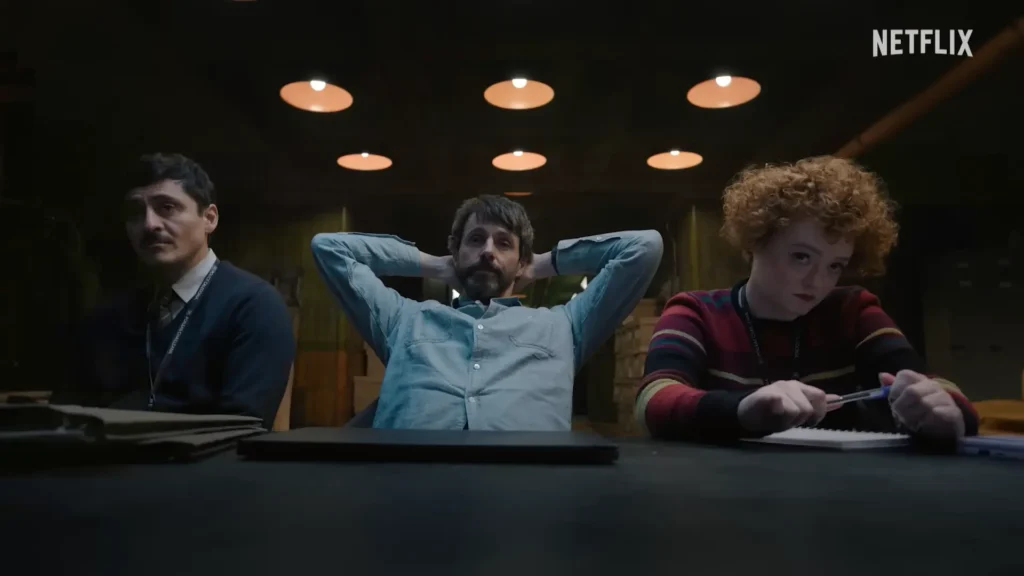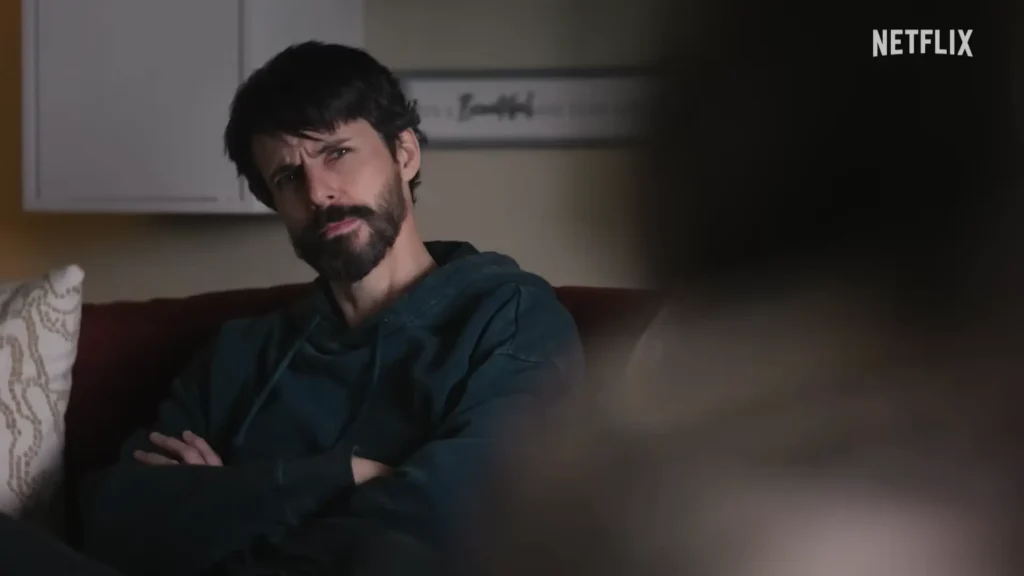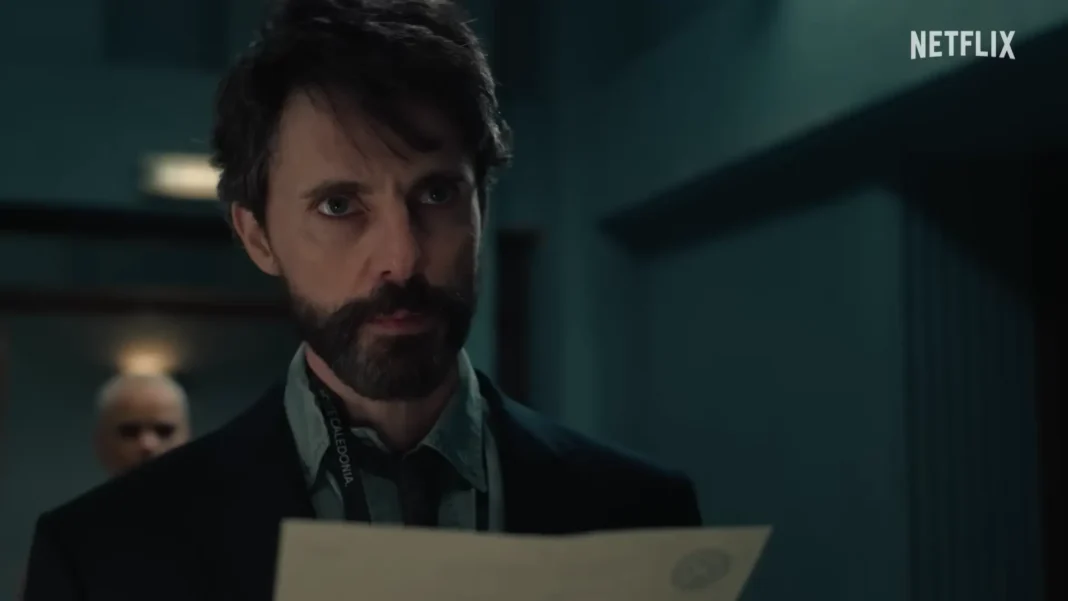Dept Q Review: Dept Q is a British crime thriller series based on books by Danish author Jussi Adler-Olsen. Starring Alexej Manvelov, Matthew Goode, and Chloe Pirrie, Department Q premiered on May 29, 2025, and is now available to watch on Netflix.
The story follows Carl, a once highly respected detective who is struggling with guilt after an incident that left his partner paralyzed and another officer dead. When he returns to work, he’s given an old unsolved case to look into—a case that ends up taking over his entire life.
Plot Summary
Carl Morck, a top detective, returns to work after a shooting left him badly injured. The incident also paralyzed his close friend and fellow officer James Hardy, and another officer was killed. Carl doesn’t get a warm welcome back—people see him as arrogant and feel he looks down on them.
He’s also dealing with trauma and must attend therapy. To boost crime-solving numbers for political reasons, the Scottish government decides to focus on unsolved cases. Carl’s boss, Moira Jacobson, is given a big budget to create a new unit, but instead of using it all for the cold case department, she uses most of it for her own team.
She assigns Carl alone to handle a huge number of cold cases and places him in an old, run-down basement office. Akram Salim, a civilian worker and former Syrian police officer who wants more meaningful work, quietly joins Carl in the basement.
He starts organizing the old cases and soon finds one he thinks has the best chance of being solved. This marks the beginning of Carl and Akram building a small team of outcasts focused on solving cases others had given up on.
A Gritty, Gripping Crime Thriller with Strong Performances

Dept Q Review: Dept Q is a gripping crime drama that stands out as one of the best in recent times. The series follows Carl Morck, played by Matthew Goode—a brilliant but disliked detective who’s put in charge of a new department handling Edinburgh’s cold cases. With a team of social misfits and overlooked officers, Carl dives into old mysteries that are anything but simple.
The story is dark, intense, and keeps you hooked through most of the season. While a few scenes feel slightly stretched out and there are perhaps a few too many flashbacks, the series overall delivers a well-paced and engaging narrative. It’s clear that a lot of care went into the writing and direction, and the show benefits from strong cinematography and a solid cast.
At first, the characters—especially within the police team—feel a bit clichéd. But over time, each one grows into their role. Their development feels natural, and the way they support and change each other adds depth to the story.
Matthew Goode is excellent in the lead role. Even if you haven’t seen much of his previous work, he proves here that he’s more than capable of carrying a series like this.
The ending deserves special praise. It wraps up the story in a grounded and satisfying way, without relying on over-the-top action or typical Hollywood drama. The final moments are quietly powerful and beautifully executed.
Dept Q is a must-watch for fans of crime thrillers, and hopefully, Netflix turns it into a long-running series—it certainly has the potential.
Department Q is Disco Elysium Meets Nordic Noir—and It’s Mesmerizing

Dept Q kicks off what could very well be the next standout crime-thriller franchise. Rooted in cold cases and buried secrets, this first season doesn’t just introduce a compelling procedural—it lays the foundation for something deeper and darker. With its slow-burn pacing, atmospheric tone, and emotionally charged storytelling, the series chooses depth over dazzle and reflection over resolution.
At the heart of Dept Q are detectives Carl Mørck and Akram Salim, whose dynamic is the soul of the show. There’s an undeniable echo of the classic Sherlock-Watson structure—but inverted and humanized. Mørck is no flamboyant genius. He’s emotionally hollowed out, broken by trauma, and leans into detachment as a means of survival.
Salim, by contrast, enters as the apparent stabilizer—a calm, watchful presence who exudes a quiet authority. There’s a distinctly “ex-military intelligence” feel to him: composed, perceptive, precise. You sense he’s trained more to observe than to react.
Their chemistry is magnetic without being sentimental. Think less buddy-cop banter, more the quietly compelling interplay of two people orbiting each other in pain. The comparison to Disco Elysium’s Du Bois and Kitsuragi is apt. Mørck, like Du Bois, is adrift—haunted and seeking redemption through his work.
Salim mirrors Kitsuragi’s calm diligence, grounding Mørck not just professionally but morally. He’s not the sidekick—he’s the conscience. The relationship they share is one built on mutual respect that grows over time, not one of dominance or dependence.
The procedural elements are strong, but they’re never the point. The real focus is on silence, atmosphere, and what is left unsaid. The mysteries unfold patiently, often uncomfortably so. Not all threads are tied up by the season’s end—a creative decision that might frustrate some, but also signals the show’s commitment to long-form storytelling.
This is a series that wants to breathe, to dwell in the uncomfortable, and to reflect the emotional weight that real grief and institutional failure leave behind.
Verdict
Dept Q doesn’t indulge in high-speed chases or snappy one-liners. It’s not here to entertain in a conventional sense—it’s here to linger, to provoke. If you’re looking for a slick, fast-paced detective show with clever twists and explosive action, this isn’t it.
But if you want something moody, character-rich, and quietly devastating, Dept Q doesn’t just merit your attention—it demands your emotional investment.
Trailer

Also Read: Bring Her Back Movie Review: A Viciously Unrelenting Descent into Horror
